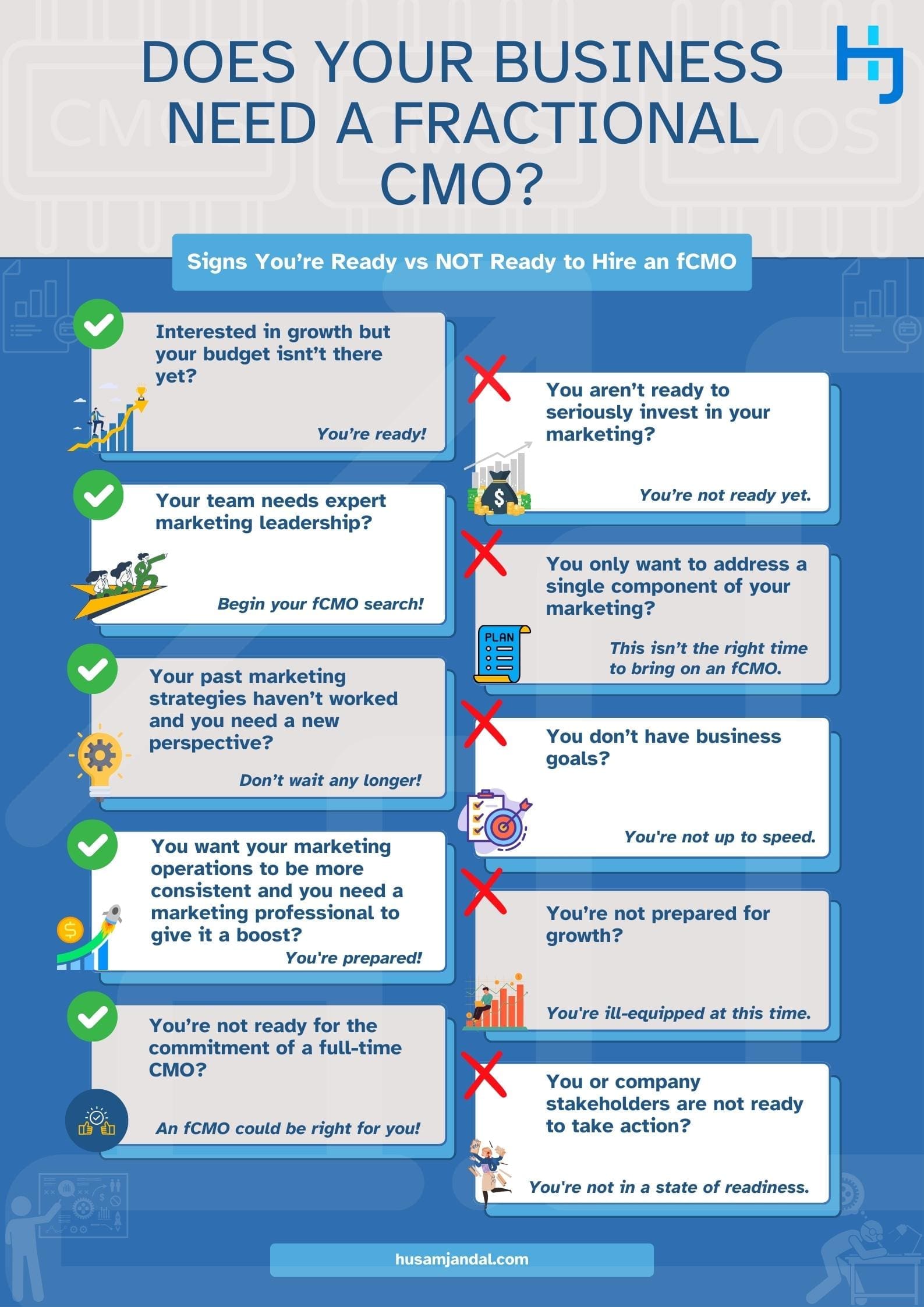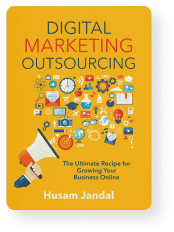
Ready to take your digital marketing strategy to the next level, but not sure if hiring a full-time chief marketing officer (CMO) is the right next step? A fractional CMO may be just what you need to align your marketing efforts and business goals without stretching your marketing budget too far. Engaging a fractional CMO will provide high-level marketing leadership without the commitment of a full-time hire, helping you align marketing strategies with overall business objectives.
What is a Fractional CMO and What Do They Actually Do?
A fractional CMO does a CMO’s job for your company but only works a fraction of the time a traditional CMO does and only receives a fraction of the pay. This part-time CMO provides strategic marketing guidance on a part-time basis, allowing your company the opportunity to level up with a lower investment. They are essentially experienced marketing professionals with industry knowledge, hired on a short-term basis. Let’s dig into the roles a bit, so it’s easier to visualize how a CMO or a fractional CMO might help you achieve your business goals.
What Does a CMO Do?
A chief marketing officer, usually referred to as a CMO, serves as a business’s overall head of marketing activities, which includes planning, developing, and executing all advertising and marketing campaigns. A CMO is also a visionary; someone who brings in new ideas and technology to drive company growth. They maximize the value of your company’s marketing resources, strengthen collaboration between departments (including your sales team), and ensure your content marketing and overall marketing process align with your current marketing strategy and target audience’s needs.
It’s a big role that can profoundly impact a business, which is why the average base salary for a CMO presently sits at over $175,000 per year, according to PayScale. Some base salaries approach $300,000 annually. While a great CMO absolutely brings comparable value to a company, most businesses can’t bring on a CMO until they’ve reached a particular stage of growth in which they have the cash to hire a CMO.
This presents a catch-22 situation. You can’t reach that level without investing, and you can’t make that investment until you grow. This is where a fractional CMO comes in.
Fractional CMO Responsibilities?
A fractional CMO, sometimes referred to as an fCMO, does all the things your CMO might do but only works part-time and is often hired as a contractor with a pre-determined term rather than a traditional employee. For example, an fCMO may be able to provide strategic marketing guidance and design a comprehensive marketing plan in as little as ten hours per week, giving your in-house team members the direction it needs to accomplish key marketing objectives.
Contract terms vary depending on a business’s marketing goals. Some fCMOs will start with a six-month contract, though most will fall in the range of 12-24 months to start. This is because the business strategy and technical setup can take a couple of months to begin with. Following this, it takes about six months to see results from certain initiatives, like SEO and social media marketing.
The Responsibilities of a Fractional CMO: What They Bring to the Table
A fractional CMO handles many of the same strategic marketing duties as a full-time CMO, but with greater flexibility. Their primary responsibilities include creating and overseeing marketing strategies, optimizing campaigns, and ensuring your marketing efforts align with business goals.
Additionally, a fractional CMO collaborates with teams to improve performance across channels like social media, SEO, and content marketing. The key advantage of a fractional CMO is their ability to provide marketing leadership experience on a part-time basis, reducing the cost of a full-time hire.
They guide your in-house team to execute marketing plans efficiently, focusing on growth and measurable results. Understanding the essential traits of a marketing strategist can help identify the right fractional CMO. Fractional CMOs also assess existing processes to eliminate waste and ensure resources are allocated wisely. Their role is especially valuable for small and medium-sized businesses that need expert guidance but can’t afford a full-time CMO.
How a Fractional CMO Can Help Companies: Understanding the Role of a Fractional Marketing Executive
A fractional CMO can help companies achieve their marketing goals by providing the function of a CMO without the need for a full-time hire. Fractional CMOs typically serve as a senior marketing leader, aligning marketing efforts with broader business objectives while focusing on optimizing the company’s overall marketing strategy. By offering fractional marketing executive services, they provide digital marketing leadership at a fraction of the cost of hiring a full-time CMO, making them ideal for businesses that need strategic marketing guidance but are not ready for a large financial commitment. A fractional CMO also brings a track record of helping companies grow, ensuring that every marketing initiative is data-driven and contributes to long-term success.
How Does Hiring a Fractional CMO Compare to Other Marketing Talent?
There are many different existing marketing models that teams use. Hiring a fractional Chief Marketing Officer provides businesses with specialized marketing expertise while offering the flexibility of a part-time marketing leader who can manage marketing teams or agencies effectively. I’ll summarize the differences across some of the most common options below.
fCMO vs. Full-time Marketing Executive
Companies in the early stages of growth often have just a strategist or marketing expert in place. More often than not, this person knows the business and its customers well. They’re also generally quite adept at carrying out specific campaign types. For example, your digital marketing manager may be a social media powerhouse. However, they likely lack in areas like strategy, budgeting, and bringing teams from different departments together.
An fCMO would not replace this person. Instead, they’d help ensure their work aligned with business objectives and other marketing initiatives, so the results of your overall marketing efforts can be improved. The fCMO would also ensure the marketing department had the right technology and resources while cutting out wasteful spending.
fCMO vs. Internal Full-Time CMO
Because an fCMO performs the same duties a CMO does, there’s little or no difference in the outcome. However, businesses spend on salary when working with a CMO.
fCMO vs. Marketing Agency
Many businesses work with marketing agencies or digital marketing agencies as they’re scaling. Working with a digital marketing agency can be problematic to begin with. The agency is removed from the business, which makes it hard for the professionals carrying out the work to carry the brand philosophies and voice throughout the content. Plus, work is often subcontracted out, and businesses wind up with multiple layers between them and those performing marketing functions.
These issues are amplified when businesses turn to their agency for fCMO services. Perhaps what’s more concerning is that an fCMO is responsible for managing vendors and ensuring they’re performing well. Therefore, it’s impossible for your fCMO to be unbiased if they’re part of your agency.
fCMO vs. Consultant
Your experience with a consultant will vary depending on how the consultant works. Some consultants work as agencies do. They’re removed from your company, which makes it difficult for them to keep a pulse on what’s really happening and address your marketing strategy as an insider will. However, there are consultants like me who become part of the team. I work with key stakeholders throughout a company and ensure the right mix of in-house and outsourced talent is leveraged to ensure the business receives the best possible results.
How Fractional CMOs Fit into Your Marketing Team
A fractional CMO is a marketing professional who seamlessly integrates with your existing marketing team to drive growth and innovation. They are experienced leaders who offer a fresh perspective, helping to align your marketing efforts with broader business goals. By acting as the leader of your in-house marketing functions, a fractional CMO leads strategic planning sessions and collaborates with existing staff to execute effective campaigns. A fractional CMO can bridge the gap between marketing and sales departments, ensuring cohesive strategies and improving overall efficiency.
Fractional CMOs are well-versed in leveraging technology and data analytics to refine marketing strategies. They help companies identify the most effective channels for reaching their target audience, thus maximizing return on investment. For companies that cannot afford a full-time CMO, hiring a part-time CMO provides access to seasoned expertise without the cost of hiring a full-time executive. This makes it easier for businesses to scale their marketing efforts up or down as needed.
Their ability to provide strategic oversight while working as an outsourced CMO ensures that the company benefits from a comprehensive marketing strategy that is both innovative and results-oriented. Ultimately, a fractional CMO and marketing team collaboration offers valuable services by enhancing the company’s ability to adapt and grow.
How Much Does Hiring a Fractional CMO for Your Business Cost?
On the journey to business success, having an expert marketing leader on your side is non-negotiable. They hold the keys to putting your products and services on the map, weaving an effective marketing strategy that drives your brand forward. Yet, the financial commitment required to bring a full-time CMO on board can pose a formidable barrier, especially for companies just finding their feet. The sticker shock from the hefty salaries demanded by these experienced marketing professionals is often enough to make potential employers think twice.
A fractional CMO, an experienced marketing professional who provides strategic marketing guidance on a part-time basis, bills their expertise by the hour. This flexible approach is designed to lighten the financial load while delivering the high-caliber marketing insight you need. While the precise hourly rate of a fractional CMO can vary depending on factors like the specific agency and geographic location, this model remains an attractive proposition for businesses striving to balance the need for top-level marketing prowess with budgetary constraints.
Working with a fractional chief marketing officer typically costs between $200 and $400 per hour. If you want to work with an experienced professional who knows your industry, expect to land on the higher end. That may sound like a lot, but when you consider that the average salary for a full-time CMO with this background would be around $300,000 annually, and that’s before you add in things like bonuses and benefits, you’re easily saving six figures by opting for an fCMO.
What Are Some Benefits of Hiring a Good Fractional CMO?
There are many benefits one to hiring a fractional CMO, which is that it can be more cost-effective than hiring a full-time CMO. They can also provide fresh, expert knowledge, and impactful marketing strategies that can accelerate company growth and help achieve business goals.
- Less Risk: Hiring an in-house CMO is a big commitment. An fCMO will be working on multiple projects, so you can gauge their abilities in advance and aren’t committing to permanent placement. If your fCMO isn’t a good fit, you can usually end the contract.
- Improved Marketing Efficiency: fCMOs are focused on your bottom line. They cut out inefficient processes while bringing in the right tech and people to improve your efficiency.
- Innovation: Fresh eyes will likely spot new approaches to improve your marketing results.
- Expert Knowledge: An fCMO may be the only way your business can afford to bring in a true expert, which means you’ll get better results and improved ROI.
- Save Time: Because an fCMO has the experience, you can skip the learning curve and jump straight to strategies that really work.
How to Ensure ROI When Working with a Fractional CMO
To ensure ROI when working with a fractional CMO, start by defining clear, measurable objectives aligned with your business strategy. Goals such as increasing lead generation, enhancing B2B marketing, or improving conversion rates allow the fractional CMO to create a strategic marketing plan tailored to your needs. By setting key performance indicators (KPIs), the fractional CMO works to track progress and refine initiatives as needed.
Collaboration across departments is critical. Fractional CMOs are experienced in bridging gaps between marketing, sales, and leadership to foster alignment and seamless execution. They bring the expertise of a seasoned marketing leader to recommend tools like automation systems that streamline workflows and enable growth with a fractional CMO.
Regular reviews and real-time data insights allow fractional CMOs to adapt strategies dynamically, ensuring resources are allocated efficiently. Fractional CMOs often deliver marketing expertise without the expense of a full-time CMO, minimizing risks and focusing efforts on long-term profitability. By combining clear goals, expert leadership, and adaptive planning, hiring a fractional CMO offers a cost-effective solution to achieving sustainable growth.
What Types of Businesses Benefit Most from the Fractional CMO Model?
The fractional CMO model is leveraged across all industries. The company’s expansion goals and growth rate tend to matter more than its current size and will impact the approach.
Fractional CMO for Startups
Startups benefit from hiring a fractional CMO because it allows the business to ensure its marketing strategies and marketing processes are set up correctly from the very beginning. This eliminates the learning curve and reduces the ramp-up time to accelerate results.
Fractional CMO for Established Companies
Experienced fractional CMOs are also adept at weeding out inefficient and ineffective strategies. Because of this, they can help established companies reach new heights and overcome barriers that have held them back in the past.
Signs Your Business Needs a Fractional CMO

Now that you know what an fCMO does and how one can help your business, how can you tell it’s time to start looking for one? If any of the following signs apply to your business, it’s time.
You Want to Grow, But Your Budget isn’t There Yet
If you’re caught in the catch-22 of needing a CMO to grow but can’t afford one yet, an fCMO is the ideal choice.
Your Team Needs Expert Marketing Leadership
You may have a fantastic in-house marketing team, but if they don’t have the right leader, or their leader can’t connect their work with other departments, you need to consider hiring a marketing professional who can.
Your Past Marketing Strategies Haven’t Worked
You should expect your marketing team to fail at least some of the time. If they never fail, they’re never trying new things and that means you’ll never get ahead. However, if your current marketing strategy is not yielding the desired results or your marketing efforts need an experienced marketing professional’s touch, then it’s time to bring in an expert fCMO.
You Feel Your Business Needs a New Perspective
Again, your existing marketing team must constantly be innovating to drive results. If your strategies and campaigns are starting to feel stale, it’s time for a fresh perspective. An fCMO can give you one.
You Want to Make Your Marketing Operations More Consistent Across All Channels
Fractional CMOs understand how everything from your website to your social media and SEO works together to produce results. They also know how to craft campaigns and implement specific marketing tactics in a way that you get maximum mileage from each asset produced. If you feel like each channel in your marketing arsenal is doing something different, it’s time to bring everything into alignment with an FCMO.
You’re Not Ready for the Commitment of a Full-Time CMO
Opening an in-house CMO role adds to your business overhead with salary, bonuses, and benefits. Adding the role also means you may need to restructure your company before you hire and must plan for a long-term engagement. If you’re not ready for this, the next logical step is an FCMO.
You Need a Marketing Professional to Boost Your Business Growth
An FCMO will have the skills necessary to level up your marketing to create measurable growth for your business. They’ll know which approaches work for any goal, be it increased retention, growing your customer base, strengthening your company with the intent to sell, or any other reason.
Signs Your Business is NOT Ready for a Fractional CMO
Despite the benefits, there are times when hiring a fractional CMO doesn’t work or would likely create additional problems. Since fractional CMOs are typically brought in to provide strategic leadership to align marketing efforts, businesses without clear goals or structure may struggle to see their full value. If any of the situations below apply to your company, it’s probably better to wait.
You Aren’t Ready to Seriously Invest in Your Marketing
A typical company will spend just shy of 14 percent of its revenue on marketing, according to HubSpot. However, the figure varies by industry. For example, finance companies spend around eight percent, and healthcare companies spend around 21 percent. If you aren’t ready to come in at the higher end or exceed it, your fMCO won’t have enough resources to work with.
With that said, there’s obviously a difference between a company that’s bringing in $100,000 per month, in which the “average” budget is $14,000, and a company bringing in $1,000,000 that has a $140,000 monthly budget.
Consider that a single initiative, such as building a website, can easily cost $9,000 per Forbes research. A typical small business also spends between $9,000 and $10,000 per month on pay-per-click (PPC) advertising, TechJury reports. It doesn’t even take into account that the salaries of a full-time digital marketing manager and copywriter could also consume a full budget on their own.
Although effective marketing typically puts at least double your investment back in your pocket, you must be prepared for the initial cash outlay of the initiatives, team, and fCMO. That usually means your annual revenue should be around five million dollars and your monthly marketing budget will be closing in on $66,000 before you’re ready to bring in a strategic marketing leader. If you aren’t prepared for this, it’s better to grow your business through digital marketing outsourcing or other methods before you invest in an fCMO.
You Only Want to Address a Single Component of Your Marketing
Business owners often recognize that a specific area of their marketing is underperforming or that they need to implement an additional strategy and begin the search with this area in mind. For instance, you may want to rank higher in Google or launch PPC ads. While a fractional CMO can address these things, hiring one would be overkill. An fCMO is all about the strategy. Their skills are better put to use evaluating your marketing as a whole, identifying the best marketing channels, and kicking off marketing initiatives in a sequence that allows ROI to build and each initiative to build off the prior ones.
If you really only want to implement or improve one area of your marketing, it makes more financial sense to hire or outsource it to a specialist in that field.
You Don’t Have Business Goals
All marketing initiatives must tie back to specific business goals. Maybe your goal is to double leads in one year, hit the billion-dollar benchmark in five years, or position your business in a way that you can sell it in seven years and retire early. Each business has unique goals. If you don’t know where you want your business to go, you’re not ready to hire someone to take you there.
If a lack of clear goals is holding you back, spend some time reflecting on them and reach out to fCMOs when you’ve got them down.
You’re Not Prepared for Growth
Most business owners dream of rapid growth, but seeing those dreams realized is a different thing entirely. A business that’s unprepared for growth can crumble under the weight of it. While you don’t necessarily need to have all the resources in place to address the next stage of growth, you should know how you’ll handle it. A few things to consider include:
- How your internal processes will scale
- How and when you’ll bring in additional talent
- How you’ll procure and store additional supplies
- How you’ll secure additional capital to cope with increased demand or unexpected issues
You or Company Stakeholders Are Not Ready to Take Action
A certain degree of concern over new initiatives or pushback is normal. Some people will want to understand how the investment is being spent, why new processes are better, and what to expect along the way. However, if key decision-makers are resistant to change for any reason, it will create barriers for your fCMO and decrease their effectiveness. Moreover, your team will be looking to leadership to decide how to respond to the changes. If company leaders are not on board, you will not get the results you want, and company morale will falter.
Sometimes, a person’s concerns can be put to rest by providing more information or by privately soliciting more feedback from them. However, if someone important on your team will become a roadblock to your progress, it’s better to wait.
How to Find a Fractional Chief Marketing Officer
Ready to look for a part-time CMO who can provide strategic insights into your market strategy, content marketing, and branding efforts? Here’s where to start.

- Your Network: You may already be connected with someone in your network who can provide fractional CMO services.
- Referrals: If you know someone who has great marketing, ask them who handles it and if they offer fCMO services, or just put out a general request to your network and ask for recommendations.
- LinkedIn: Check your connections or run a search for marketing consultants and fCMOs. You may find someone connected to you or who already has endorsements from people you know.
- Trade Groups: Sometimes specialty marketers link up with industry trade groups. Although it’s not quite as good as a referral or endorsement, it’s at least a sign that the professional has some experience with your industry.
- Fractional CMO Companies: A fractional marketing agency or fractional CMO agency can help you find a qualified candidate. However, if you go this route, ensure you’ll be able to build a long-term relationship with a single fCMO or that you can hire a fractional CMO directly so that your brand gets the focus and attention it deserves.
Meet Husam
Hi! I’m Husam Jandal. I diagnose companies from the ground up and develop tailored solutions that prime their operations, sales, and marketing for success. I refer to myself as a digital marketing consultant, though I operate much like an fCMO.
I’ve helped Fortune 100 companies scale, educated Google Partners, and written several books on digital marketing, but I enjoy working with small and midsize businesses and helping them grow the most. If you’re looking for an fCMO, let’s schedule some time to talk about your business and goals.
Tips to Get the Most Out of Your Fractional CMO Relationship
Hiring a fractional CMO is an investment. Following a few best practices will help you maximize your return.
Partner with an Experienced Fractional CMO
We can see in Google Trends data that the concept of a fractional CMO is nothing new. However, interest recently peaked.
The recent spike correlates with the release of a book that teaches marketing professionals and CMOs the fCMO model or how to establish themselves as fCMOs. While there’s nothing wrong with this approach, it does mean that the market now has an abundance of people who label themselves as fCMOs but don’t necessarily have the skills required. When you choose your fractional CMO, look for:
- Total years of marketing experience
- Total years of fCMO experience
- Proven methodology and a successful track record
- Experience overseeing marketing strategy for several companies at once
- Experience across multiple industries
- A background in serving businesses like yours
Establish Fractional CMO Marketing KPIs Together
A good fCMO is more like a partner. If you’ve vetted them well, you should be able to trust that they’re bringing their successful processes with them to your company. A strong fCMO will evaluate your company’s current status and put together a timeline on their own. However, they’ll need you to provide high-level goals for the company and insights throughout the planning process.
Give Your Fractional CMO Time to Work
Your fractional CMO should provide you with a realistic timeline and clear expectations of what you will achieve at each stage. However, it does take time to see results. Early initiatives will likely be related to laying the foundations for successful marketing rather than kicking off initiatives. Following this, it will take months for certain initiatives, such as SEO and social media marketing, to produce results. The results can be dramatic, but they won’t happen overnight if you’re working with an experienced professional who is working with your company’s best interests in mind.
Stay in the Loop
Experienced fCMOs understand the importance of regular reporting and accountability. They also view you as a valuable resource and are excited to share your successes. Because of this, they’re likely to set up communication channels and regular meetings without you having to request anything. Make yourself available as needed in these situations and read through reports as they come in so that you have a pulse on what’s happening.
Learn More About Fractional CMO Services
Although I refer to myself as a digital marketing consultant, I address many of the same areas a CMO or fCMO does, using my extensive experience to provide strategic marketing guidance. I work with stakeholders to build high-performance marketing teams and implement strategies that get results. This is all done from within the company. My goal is to help you reach your marketing objectives and ultimately set your team up so that it can be successful without me. Although I have decades of experience helping Fortune 100 companies scale, I prefer working with small to medium-sized businesses that are as passionate about growth as I am.
If you’re on the fence about whether a CMO, fCMO or another professional is best, let’s chat about where your business is now and where you want to go. Contact me for a complimentary consultation.
Fractional CMO FAQs
What Does a Fractional CMO Do?
The fractional CMO job description includes strategic planning, overseeing digital marketing efforts, managing campaigns, and aligning marketing goals with business objectives. They provide comprehensive marketing leadership and ensure that each campaign drives measurable growth. By leveraging their expertise in various areas of marketing, a fractional CMO brings in fresh insights and innovative strategies to catapult your marketing forward.
How Can a Fractional CMO Help My Business Grow?
A fractional CMO provides guidance tailored to the company’s growth stage, focusing on strategy, execution, and scalability. They assess your existing marketing needs, develop targeted campaigns, and manage the implementation of marketing strategies. The role of a fractional CMO is especially valuable for businesses aiming to scale quickly but needing to do so in a cost-effective way.
How Do Fractional CMOs Differ from Full-Time Marketing Executives?
While a full-time marketing executive works exclusively for one company, fractional CMOs work for multiple clients, providing flexibility and significant cost savings. They offer the same level of strategic marketing leadership and experience as a full-time executive, but on a part-time basis. This setup is ideal for companies that need expert guidance but are not ready for the high salary and benefits associated with a full-time CMO.
What Are the Costs of Hiring a Fractional CMO?
The cost of hiring a fractional CMO varies depending on the fractional CMO job description and the scope of work. Fractional CMO costs typically range from $200 to $400 per hour, depending on their level of experience and the specific needs of your company. This flexible pricing model allows businesses to gain high-level marketing expertise without the substantial investment required for a full-time marketing executive.
How Long Do Fractional CMOs Typically Work with a Company?
Fractional CMOs typically work with companies on a project or contract basis, often for terms ranging from six months to two years, depending on the company’s marketing goals and objectives. Many fractional CMOs work with a company long-term to achieve sustained growth, offering continuity and deep insights into the business’s marketing needs.
What Types of Businesses Benefit Most from a Fractional CMO?
Businesses of all sizes, from startups to established companies, can benefit from the strategic guidance that fractional CMOs bring. Startups often need direction for initial marketing and branding, while established companies might use fractional CMOs to redefine their digital marketing efforts or target new growth areas. Fractional CMOs offer a scalable solution for companies that need seasoned expertise without a full-time executive’s financial commitment.
How Can a Fractional CMO Integrate with My Existing Marketing Team?
A fractional CMO provides strategic marketing leadership by collaborating with your current marketing and sales teams, aligning goals, and enhancing efficiency. They lead digital marketing efforts, oversee campaign strategy, and ensure seamless communication between departments. This integration allows your team to gain valuable insights and execute marketing initiatives effectively.
How Does Hiring a Fractional CMO Compare to Working with a Marketing Agency?
While marketing agencies are skilled at executing specific campaigns, a fractional CMO brings a holistic perspective focused on aligning marketing needs with long-term business goals. A fractional CMO owns your marketing function, overseeing strategy, optimizing resources, and ensuring consistent messaging across all channels, while an agency might focus only on specific tactics.
What is the Role of a Fractional CMO in Managing Digital Marketing?
The role of a fractional CMO includes overseeing all aspects of digital marketing, from strategy to execution. They analyze data, refine processes, and drive initiatives that maximize return on investment across digital channels. This leadership helps companies stay ahead in a competitive digital landscape while optimizing their marketing budgets.
How Can a Fractional CMO Help Align My Marketing and Sales Teams?
Fractional CMOs provide the strategic oversight needed to bridge gaps between marketing and sales teams. By fostering collaboration, they ensure that marketing efforts align with sales objectives, creating a unified approach that maximizes conversions and builds customer loyalty. This alignment enhances efficiency and ensures that all teams work towards common business goals.
How Do I Find the Right Fractional CMO for My Business?
When seeking a fractional CMO or marketing consultant, consider their experience, track record, and ability to meet your company’s unique needs. A fractional CMO brings expertise in strategic marketing leadership, industry knowledge, and a proven methodology to achieve your marketing goals. Look for someone with a background in your industry and the skills necessary to guide your team and enhance your digital marketing efforts.
What Are the Key Benefits of Having a Fractional CMO Build Your Marketing Plan?
A fractional CMO brings the expertise needed to create a tailored marketing plan that aligns with your business goals while addressing unique challenges. By leading the marketing team and collaborating with your marketing staff, a fractional CMO ensures your marketing function operates efficiently and stays on track. They focus on scaling your marketing efforts by introducing innovative strategies, optimizing resources, and integrating new marketing techniques. Unlike committing to a full-time CMO, a fractional CMO provides access to top-tier marketing leadership at a fraction of the cost, enabling your business to grow strategically while minimizing expenses.





































































